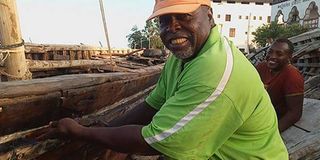Premium
Lamu boat makers say logging ban affecting their business

A boat maker at work in Lamu Old Town. He says the mangrove logging ban has greatly affected their activities. PHOTO | KALUME KAZUNGU | NATION MEDIA GROUP
What you need to know:
- Almost all Lamu motor boats which are used for long distance shipping are made of mangrove wood.
- The logging ban has made it difficult for the boat makers to make new ones or even repair their vessels.
- Mr Ali Hydar called on the government to allow the Lamu boat makers to access the forest to obtain timber.
Lamu boat operators have decried dwindling shipping business following the prolonged ban on mangrove logging in the county, which has directly affected their activities.
Almost all Lamu motor boats which are used for long distance shipping are made of mangrove wood but the logging ban has made it difficult for the boat makers to make new ones or even repair their vessels.
A nationwide logging ban was imposed on February 24 this year by Deputy President William Ruto with the main objective being to fight environmental destruction, protect water towers and to mitigate effects of drought across the country.
DWINDLING BUSINESS
Boat makers and shippers who talked to the Nation in Lamu on Tuesday said the blanket ban has greatly contributed to the dwindling business in the shipping sector as most boats in need of repair have had to be parked in their yards due to lack of the mangrove wood.
A spot check by the Nation in major shipping destinations such as Lamu Old Town, Ndau, Pate, Faza, Kizingitini, Kiwayu, Mkokoni and the far flung islands of Kiunga and Ishakani on the border of Lamu and Somalia revealed that more than 2,000 boats and their operators have been forced to quit the trade over the last nine months when the ban has been in place owing to the dilapidated state of their vessels which are in dire need of repair.
Mr Lali Shali, 54, a boat owner and maker in Lamu Old Town and who has been in the shipping business for the past 30 years said since February, they have had to grapple with the absolute lack of repair materials for their boats since they are not allowed to access the forest to harvest mangroves for timber which they use to build their boats.
NEED REPAIR
“As you can see, many of our boats here are parked in the yards. They can’t operate since they need repair. We use mangrove wood to do all that. We can’t also make new boats since the existing logging ban is denying us access to the forest. We are afraid the shipping sector here in Lamu will be forced to close down if the is not lifted,” said Mr Shali.
Another boat maker and coxswain Ali Hassan, 45, said the bad state of their boats has kept customers away.
Mr Hassan says many customers who used to travel using their wooden motorboats are now opting to travelling using fibre speed boats which look new and attractive to them.
“We have no materials to repair the boats and many of our vessels now look old and dilapidated. That alone has led us to lose customers who opt to using fibre speed boats rather than our wooden motorboats. The government should look into this,” said Mr Hassan.
ACCESS FOREST
Mr Ali Hydar, 44, who has also been in the shipping trade for decades, called on the government to allow the Lamu boat makers to access the forest to obtain timber.
He says the nine months of ban have brought enough damage and called for the immediate lifting of the mangrove logging ban.
He says the worst affected are the long distance shippers, all who use wooden motorboats.
Mr Hassan Ramadhan feels the nationwide logging ban should have excluded mangroves.
LAMU HERITAGE
“Mangrove logging as well as boat making and shipping is an inherited tradition spanning many decades. People should know that mangroves are literally part of the culture and heritage of Lamu and as such Lamu can’t function without mangroves. Livelihoods are dead too, nothing is normal anymore. We ask the government to reconsider its decision. The ban should have excluded Lamu,” said Mr Ramadhan.
Early September, the national government, through the Environment and Forestry Chief Administrative Secretary Mohammed Ealmi had promised to have the ban lifted immediately, but this is yet to materialise.





